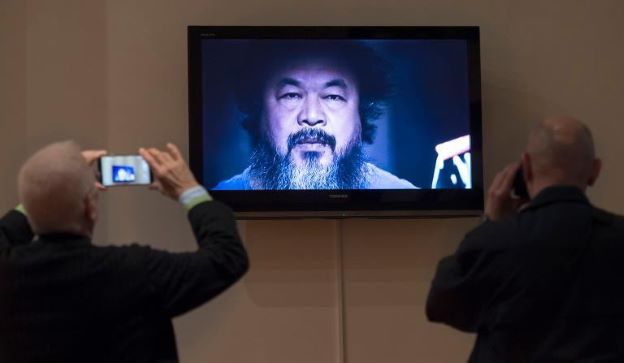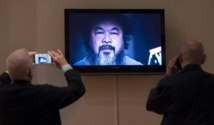Its 18 rooms of mainly new installations pack a stinging critique of official corruption, political repression and capitalist excess in the world's most populous country.
The high-profile dissident painter, photographer, filmmaker, sculptor, architect and blogger will not be allowed to travel to the German capital for the opening of the show called "Evidence" as the Chinese authorities confiscated his passport, organisers said Wednesday.
But Ai's provocative spirit is present throughout the 3,000-square-metre (32,300-square-foot) space the museum has dedicated to him.
At a media preview ahead of the official opening, the museum's director Gereon Sievernich presented a haunting video of Ai at his studio expressing hope he will be able to attend the Berlin exhibition before it closes on July 7.
"I hope the audience in Berlin can enjoy it, and also can criticise it," he said, speaking in English.
"I don't know what will happen in the near future but I still hope that I can come to see the show and share the moment with the audience and give an explanation of the work."
Ai is China's most prominent political activist alongside writer and Nobel Peace Prize winner Liu Xiaobo, and a darling of the Western art world.
The show's title "Evidence" refers to the proof -- or lack of it -- that the Chinese authorities used to detain Ai on charges of massive tax fraud during a roundup of activists three years ago.
One of its most talked-about installations is a replica of the jail cell in which the artist was held at an unknown location.
Called "81" for the number of days Ai spent inside, the chilling reconstruction features a narrow single bed, two chairs, a desk, a wardrobe, walls lined with foam recalling a padded cell and white steel bars over a sole small window high on the wall.
A filthy bathroom is adjacent.
After a few minutes inside the room, the air becomes stifling.
- Detained, interrogated, defamed -
Another space is filled with porcelain river crabs, a symbol deployed by Chinese Internet users to protest online censorship.
And three twisted metal bars replicated in marble stand for the horrific damage wrought by the 2008 Sichuan earthquake which killed more than 80,000.
Ai publicly blamed corruption and official incompetence for structural faults in state buildings such as schools for the thousands of children who perished in the disaster.
"Han Dynasty Vases with Auto Paint" contrasts China's cultural heritage with the scramble to acquire Western goods, in this case, German luxury cars.
Ai's trademark wit is also on display, with marble "surveillance cameras" hanging at the museum entrance.
The German government says it has often raised Ai's case with Chinese officials behind closed doors even as it bolsters ties with Beijing, but German leaders did not speak publicly about the artist during Xi's visit last week.
However Culture Minister Monika Gruetters delivered a stinging indictment of Beijing's treatment of its dissidents as she opened the exhibition, calling it Germany's "cultural event of the year".
She said Ai could be China's "national cultural institution, the cultural pride of his nation".
"Instead he is detained, interrogated, defamed," she said.
"Germany learned a lesson from its two dictatorships: art and science are free."
She called on the Chinese government to allow Ai to travel abroad.
"We all pledge this unwavering free spirit our deep solidarity," she said.
Sievernich noted that Martin Gropius Bau, a sprawling late 19th century building, was itself a politically charged venue, having stood over the course of its history next door to the Nazis' Gestapo headquarters and later, in the shadow of the Berlin Wall.
-------------------------------------------------------------
The high-profile dissident painter, photographer, filmmaker, sculptor, architect and blogger will not be allowed to travel to the German capital for the opening of the show called "Evidence" as the Chinese authorities confiscated his passport, organisers said Wednesday.
But Ai's provocative spirit is present throughout the 3,000-square-metre (32,300-square-foot) space the museum has dedicated to him.
At a media preview ahead of the official opening, the museum's director Gereon Sievernich presented a haunting video of Ai at his studio expressing hope he will be able to attend the Berlin exhibition before it closes on July 7.
"I hope the audience in Berlin can enjoy it, and also can criticise it," he said, speaking in English.
"I don't know what will happen in the near future but I still hope that I can come to see the show and share the moment with the audience and give an explanation of the work."
Ai is China's most prominent political activist alongside writer and Nobel Peace Prize winner Liu Xiaobo, and a darling of the Western art world.
The show's title "Evidence" refers to the proof -- or lack of it -- that the Chinese authorities used to detain Ai on charges of massive tax fraud during a roundup of activists three years ago.
One of its most talked-about installations is a replica of the jail cell in which the artist was held at an unknown location.
Called "81" for the number of days Ai spent inside, the chilling reconstruction features a narrow single bed, two chairs, a desk, a wardrobe, walls lined with foam recalling a padded cell and white steel bars over a sole small window high on the wall.
A filthy bathroom is adjacent.
After a few minutes inside the room, the air becomes stifling.
- Detained, interrogated, defamed -
Another space is filled with porcelain river crabs, a symbol deployed by Chinese Internet users to protest online censorship.
And three twisted metal bars replicated in marble stand for the horrific damage wrought by the 2008 Sichuan earthquake which killed more than 80,000.
Ai publicly blamed corruption and official incompetence for structural faults in state buildings such as schools for the thousands of children who perished in the disaster.
"Han Dynasty Vases with Auto Paint" contrasts China's cultural heritage with the scramble to acquire Western goods, in this case, German luxury cars.
Ai's trademark wit is also on display, with marble "surveillance cameras" hanging at the museum entrance.
The German government says it has often raised Ai's case with Chinese officials behind closed doors even as it bolsters ties with Beijing, but German leaders did not speak publicly about the artist during Xi's visit last week.
However Culture Minister Monika Gruetters delivered a stinging indictment of Beijing's treatment of its dissidents as she opened the exhibition, calling it Germany's "cultural event of the year".
She said Ai could be China's "national cultural institution, the cultural pride of his nation".
"Instead he is detained, interrogated, defamed," she said.
"Germany learned a lesson from its two dictatorships: art and science are free."
She called on the Chinese government to allow Ai to travel abroad.
"We all pledge this unwavering free spirit our deep solidarity," she said.
Sievernich noted that Martin Gropius Bau, a sprawling late 19th century building, was itself a politically charged venue, having stood over the course of its history next door to the Nazis' Gestapo headquarters and later, in the shadow of the Berlin Wall.
-------------------------------------------------------------









 Home
Home Politics
Politics











